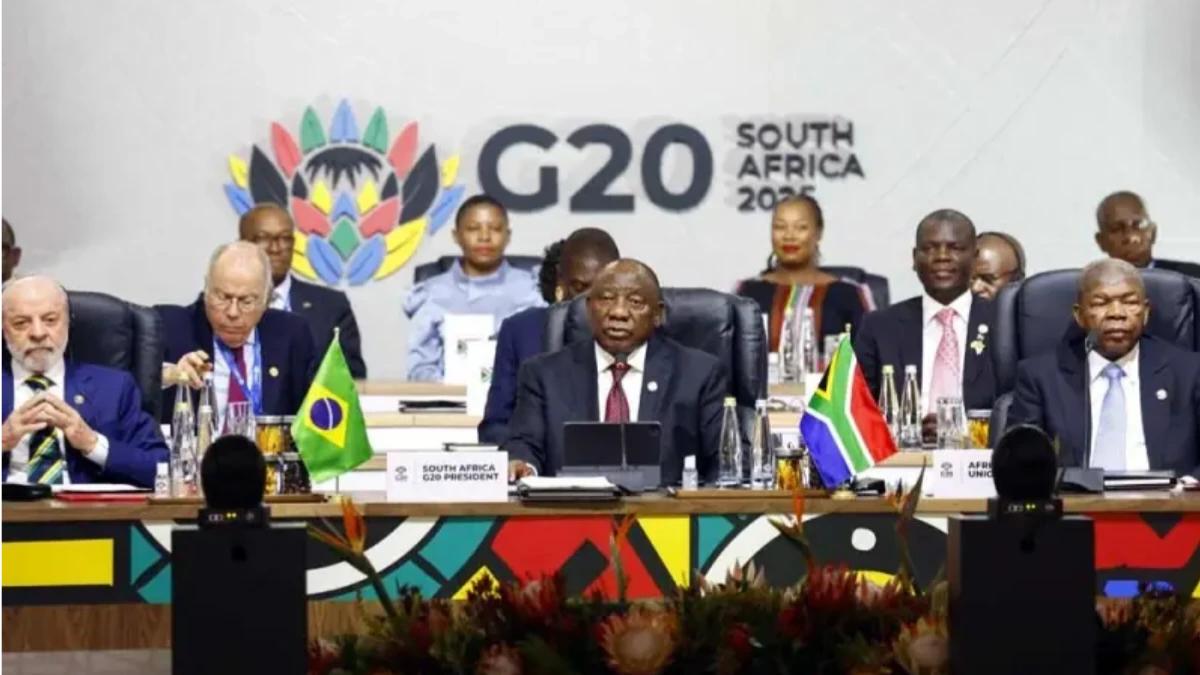JOHANNESBURG — South African President Cyril Ramaphosa formally closed the G20 summit in Johannesburg on Saturday, striking a gavel to mark the end of a two-day gathering that drew attention for a U.S. boycott and disputes over the handover of the G20 presidency.
Ramaphosa rejected a US proposal that would have him pass the presidency to a relatively junior embassy official ahead of the 2026 summit in Florida.
“We’ve met in the face of significant challenges and demonstrated our ability to come together, even in times of great difficulty, to pursue a better world,” Ramaphosa said in his closing address.
“This gavel of this G20 summit formally closes this summit and now moves on to the next president of the G20, which is the United States, where we shall see each other again next year.”
The Johannesburg summit, which brought together the world’s largest economies, was presented by South Africa as a triumph for multilateralism but was overshadowed by the absence of the US, which has previously accused South Africa of discriminating against white minority Afrikaners, a claim widely discredited by international observers.
The G20, founded in 1999 following the Asian financial crisis, consists of 19 nations and the European Union, with the African Union joining in 2023.
It serves as a forum for major economies to coordinate on issues such as global growth, climate change, trade and conflict resolution.
This year’s summit in Johannesburg was expected to focus on climate action, gender equality and global security challenges. South Africa aimed to push for a unified G20 leaders’ declaration, despite US opposition.
The U.S delegation, citing protocol concerns and objections to the draft declaration, declined to participate. White House spokesperson Anna Kelly said, “This, coupled with South Africa’s push to issue a G20 leaders’ declaration, despite consistent and robust US objections, underscores the fact that they have weaponized their G20 presidency to undermine the G20’s founding principles.”
Officials in Johannesburg had proposed that a junior diplomat formally hand over the G20 presidency to the United States at the foreign ministry.
South African Foreign Minister Ronald Lamola told reporters, “From us, the ball has moved. We are done. It’s up to them. If they want to come, we are available.”
The 2026 G20 summit is scheduled for the Trump National Doral Miami golf resort, owned by the Trump Organization, continuing the tradition of rotating presidencies among member states.
Experts say the US boycott reflects both diplomatic tensions and domestic policy disagreements. Dr. Lindiwe Maseko, a Johannesburg based political analyst, said, “The absence of the United States signals frustration with South Africa’s handling of the presidency handover and the content of the summit declaration. It’s unusual, but not unprecedented in G20 history.”
Economic analyst Daniel Weiss of the Global Policy Institute noted, “Despite the U.S. boycott, the summit achieved progress on key issues such as climate change and gender equality. These commitments could influence policies across emerging and developed economies, even if full US participation remains limited.
The declaration issued by the summit emphasized tackling climate change, advancing gender equality, and pursuing global peace, highlighting conflicts in Sudan, Ukraine, the Democratic Republic of Congo, and the Occupied Palestinian Territory.
According to the International Monetary Fund, G20 countries collectively account for nearly 80 percent of global GDP and over 60 percent of the world’s population.
Climate pledges made during the Johannesburg summit build on previous commitments outlined in the 2015 Paris Agreement, which the United States formally withdrew from under the Trump administration before partially rejoining under later policies.
The summit also underscored disparities in representation. While the G20 includes major economies from Africa, Asia, Europe and the Americas, the absence of US and Argentine leaders President Javier Milei skipped the summit created a noticeable gap in global representation.
Local business leaders in Johannesburg welcomed the summit. Sipho Dlamini, CEO of a renewable energy firm, said, “Hosting the G20 puts South Africa on the global map for leadership in climate and economic issues. The discussions here may translate into tangible support for African businesses.”
Civil society groups expressed cautious optimism. Thandiwe Nkosi, director of Women for Climate Action, said, “The summit’s focus on gender equality is encouraging, but implementation remains the challenge. We hope member states follow through on their commitments.”
Observers say the US handover dispute may continue to influence G20 dynamics in 2026. Diplomatic channels are expected to remain active to ensure a smooth transition of the presidency, while the summit’s climate and gender pledges could serve as benchmarks for future sessions.
Analysts also note that the inclusion of the African Union in G20 decision making represents a shift toward more global inclusivity, signaling that emerging economies may increasingly shape international agendas.
The Johannesburg G20 summit concluded with South Africa asserting its leadership role despite diplomatic friction and the absence of the United States.
The gathering produced commitments on climate, gender equality and conflict resolution, while highlighting the complexities of multilateral negotiations in a polarized global landscape.
As the presidency transitions to the United States for the 2026 summit, officials and experts alike will monitor how these decisions influence the G20’s role in addressing pressing economic, social and environmental challenges.
